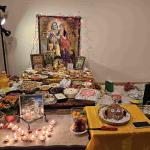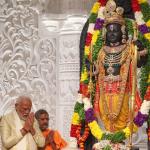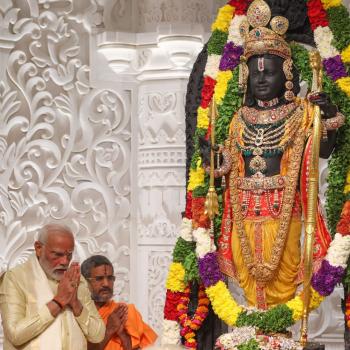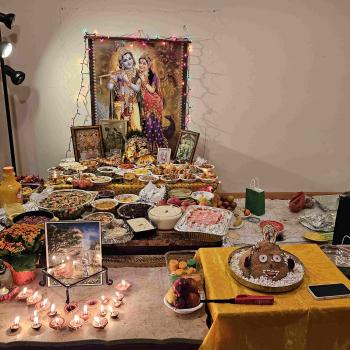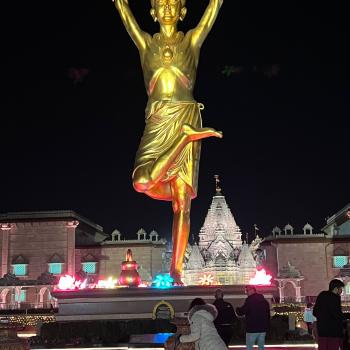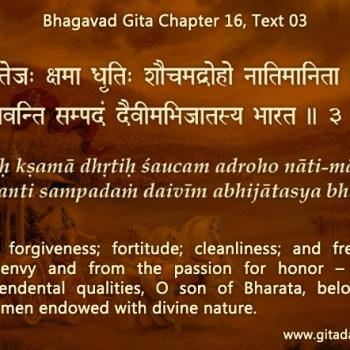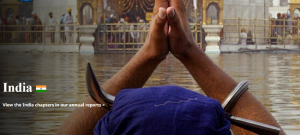
Why is Bharat’s Religious Freedom Monitored by Only Individuals of Abrahamic Faith?
Background: The world’s topmost religions include Christianity (~2.4 B), Islam (~1.9B), Hinduism (~1.2B), and Buddhism (~0.5 B). The last two religions originated in ancient Bharat with about 5,000 old history and civilization. Today’s Bharat (known as India) has a population of about 1.4 B and is a Hindu-majority nation. Hindus are inherently secular.
The religious demography in Christian-dominated America, according to a PRRI report in 2021 (www.prri.org), includes 1% Jewish, 1% Muslim, 1% Buddhist, 0.5% Hindu, and 1% who identify with other religions. This study was updated in 2022 with proportion remaining nearly unchanged.
Equally important in the PRRI report is the highest educational attainment of Hindus in the United States. For example, the majority of Hindu (67%), Unitarian Universalist (59%), and Jewish Americans (58%) have four-year degrees or higher. Among other non-Christians, only 39% of Muslims and 37% of Buddhists have a four-year degree or higher.
According to a study by the Pew Research Center (PRC), Muslims are projected to grow from about 23.2 % in 2010 to 29.7% in 2050 in population. The Christians, Hindus, and other religious groups will hold their numbers steady or decline. Thus the dominant Christian population in the U. S. stands to be superseded by Muslims by 2050. We surmise that the rising number of Muslims globally, and Bharat in particular, is a potential threat in the future.
U.S. Envoy, Eric Garcetti, characterizes the Bharat-U.S. relationship as “multiplicative.” It is built on four Ps- peace, prosperity, planet, and people, said Garcetti. Yet, the U.S. continually watches Bharat as a hawk with suspicion.
Central Questions/Issues?
- What moral authority/jurisdiction does the U.S. have in monitoring and meddling in Bharat’s internal affairs? Broadly, why monitor religious freedom anywhere? Why should the U.S. be judging and/or monitoring the state of freedom and democracy?
- Why most Commissioners of USCIRF (United States Commission on International Religious Freedom) are of Abrahamic religion? Why not utilize the ‘Diversity and Inclusivity’ of all major religions? Is there a ‘Christian Conspiracy’ or broadly ‘Abrahamic religion conspiracy’ to keep people of non-Abrahamic faith at bay? Does Christianity (the largest world religion) and the largest Christian population in the U.S. make it a superior authority to meddle and label countries with punitive, and not persuasive, names?
- Why is Israel, with the largest Jewish population, not under the scanner? It is surrounded by Islamic countries and accused of religious tensions/intolerance. The related issue is why even include one or more Jewish commissioners at USCIRF?
- Is the U.S. immune from the instances of religious discrimination and intolerance? Why not engage in its soul-searching? For example, the U.S. has had attacks on Synagogues, Hindu temples, and mosques which are perhaps direct consequences of religious hatred and acrimony. How would the U.S. feel if it was categorized as one of a Country of Particular Concern by a non-USCIRF entity?
New Bharat, Indian Americans, and Hinduism
New Bharat is relatively self-sufficient with the fifth-largest world GDP ranking. It had its own Covid vaccine which saved millions of lives at home and abroad. A member of global groups like G-20, Bharat commands respect among all nations under its charismatic leader, Narendra Modi. The U.S. need not feel threatened and challenged by Bharat’s Hindu majority and the nationalist Modi putting his people’s interest and development ahead of everything. Modi only espouses Bharat to be among the equals.
Bharat is the largest, most established, and strong democracy. Its peace-loving and God-fearing majority Hindus have lived in harmony with all including Muslims even after Bharat’s division based on religious grounds by Colonial powers. Regrettably, many Western powers and Islamic groups are not accepting the reality of the new Bharat with its rightful geopolitical influence and stature on the world stage.
Indian Americans in the U.S. constitute a significant part of its economy with the highest per capita income among various immigrant groups. People of the Hindu faith in the U.S. (~ 0.5% ) may seem small but are smart and intelligent. They are corporate leaders, scientists, engineers, physicians, information technology professionals, innovators, investors, business owners, and entrepreneurs. Yet, they live humbly and thankful for the opportunities in America.
Whatever it is worth, a Hindu (Vivek Ramaswamy) was in the Presidential race among Republicans until the Iowa caucus. Two women of Hindu/Bharat origin are Vice President Kamala Harris (Democrat) and the Republican Presidential candidate, Nikki Haley.
Hinduism, with its deep-rooted foundation in Sanatan Dharma, is known for its diverse beliefs, practices, and customs with a high level of tolerance for people of all faiths. Despite the many atrocities faced by Hindus at the hands of Muslim invaders and Colonialists in the British Raj, Hinduism has survived and thrived. It remains a significant and proud part of Bharat’s identity. An unprecedented rise in Bharat’s political, economic, and social stature, its strong cultural revival, and the Dharmic renaissance since 2014 have changed its global trajectory.
The dominance of Muslim invaders, their cruelty toward Hindus including forced conversion to Islam, and the desecration of Hindu culture, traditions, and religion are still evident after hundreds of years. Examples of ancient Hindu mandirs demolished and incarcerated include the Kashi Vishwanath, Krishna’s birthplace in Mathura, and Ram Mandir in Ayodhya. The first two are under litigation to be rightfully returned to Hindus like the Ram Mandir’s return and opening this month. Such disputes are a source of religious conflicts.
Unfortunately, Bharat’s rise is under systemic and systematic attacks by the anti-Bharat and anti-Hindu forces both at home and abroad. Negativity about Bharat’s religious freedom and democracy are just the tip of the iceberg. Other unsuccessful attempts in the West include the idea of dismantling the indestructible Hindutva and dividing Hindus based on casteism.
Religious freedom in Bharat is truly not an issue. We discuss it in part 2 based on the Pew Research Center (PRC) findings. If anything, the growing Islam, faster than Hinduism (projected in the PRC), may exert a greater influence over Hindus. This has a huge potential to deeply disturb Bharat’s culture, art, and social norms, and cause communal unrest and violence.
The U.S. Reports in Question
We cite three specific reports published in 2023 which are an annual feature. One of these is by USCIRF and the other by the Department of State’s Office of International Religious Freedom (OIRF). Both agencies are funded with tax-payers money and monitor freedom of religion in select countries around the world including Bharat. These reports duplicate and complicitly complement each other in labeling Bharat with an unfounded claim of a growing lack of religious freedom.
The third report by the Freedom House monitors “freedom” worldwide using its standards and rubric. It labels the United States “free” with an overall score of 83 while Sweden, Norway, and Finland have a perfect score of 100. Why does the U.S. have surveillance and a gatekeeper of the world with its homeland fraught with economic, social, religious, and political challenges? The Freedom House report will be a topic for an in-depth analysis elsewhere. We mention it because it labels Bharat as “partly free,” a baseless accusation stemming, in part, from the fringes of the lack of religious freedom.
Why Monitor Religious Freedom in Bharat?
As stated earlier, the U.S. has no moral, legal, and/or statutory authority to monitor and meddle in any country’s internal affairs. Additionally, why should the U.S. Congress legislate and impose punitive labels that suit their political whim, vocabulary, and misconstrued superiority? Why label any sovereign entity as a Country of Particular Concern (CPC), Special Watch List (SWL), and Entities of Particular Concern (EPC)? The U.S. is no longer the ‘singular’ superpower of the yesteryears. It is time for America to accept that its influence as the political and economic power and its Christian superiority are waning.
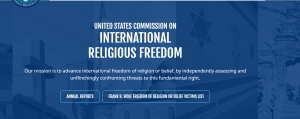
The India-specific report by USCIRF cites the lack of religious freedom based on its severely limited research and select news media reports. It alleges that religiously discriminatory policies negatively impact Muslims, Christians, Sikhs, Dalits, and Adivasis (indigenous peoples and scheduled tribes).
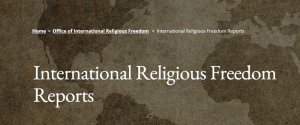
A similar report is published by the OIRF under the leadership of Rashad Hussain, Ambassador at Large. He serves as principal advisor to the Secretary of State and an advisor to the President on religious freedom conditions and policy. Hussain leads the efforts to monitor religious freedom abuses, persecution, and discrimination worldwide except what happens in the homeland.
We question the creation of taxpayer-funded USCIRF, a so-called “independent” entity if the State Department monitors religious freedom abuses. It is a total waste and abuse of public funds fraught with vested political interests to monitor and accuse the countries of their choosing. We characterize it as undue interference by the U.S. in their internal affairs.
Who Is Monitoring Religious Freedom?
The USCIRF has the following nine Commissioners with none of them of Hindu faith. The professional staff also appears to have no one with a Hindu background. The Commissioners include six Christians, two Jews, one Muslim, and only one woman. A poor gender balance and even poorer religious makeup. The appointees’ political affiliations include five Democrats and four Republicans. What an oxymoron calling the political appointees (at USCIRF) “independent?” It is also worth noting that OIRF is also headed by a Muslim; thus no Hindu in leadership position in 2023.
Commissioner Background Appointed by Term expiring
Abraham Cooper Jewish Mitch McConnell (R) May 2024
Frederick Davie Christian Charles Schumer (D) May 2024
David Curry Christian Kevin McCarthy (R) May 2024
Susie Gelman Jewish President Biden (D) May 2025
Mohamed Magid Muslim President Biden (D) May 2024
Stephen Schneck Christian President Biden (D) May 2024
Nury A. Turkel Christian Nancy Pelosi (D) May 2024
Eric Ueland Christian Mitch McConnell (R) May 2024
Frank Wolf Christian Kevin McCarthy (R) May 2024
Furthermore, most USCIRF Commissioners since inception have been of Abrahamic faith except two with Hindu names and one of Buddhist faith. The first Hindu Commissioner was Preeta Bansal (2003-04), an erstwhile senior Obama administration official. Anurima Bhargava (2018-19) was the second Indian American from “a dharmic, non-Abrahamic faith background.” The only Tibetan American (Buddhist)to be a USCIRF Commissioner was Tenzin Dorjee.
USCIRF will be more objective in its deliberations with a good proportion of Hindu Commissioners or scholars of Hinduism. We have analyzed USCIRF’s biased report elsewhere (part 1, part 2, part 3, and part 4). The USCIRF has recommended Bharat as a “Country of Particular Concern” since 2020. The State Department has not accepted the recommendation yet. We unequivocally agree and suggest that the new Bharat is a “Country of Profound Confidence.”
Part 2 will recommend dissolving the USCIRF and OIRF as wasteful and unnecessary agencies. In the interim, we recommend the appointment of Hindu Commissioners as the term of most Commissioners (except Susie Gelman) is due to expire in May 2024. Thus the potential exists for the American Hindu community to advocate in Congress and the White House for more Hindu Commissioners.


